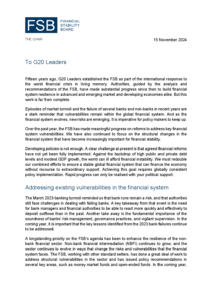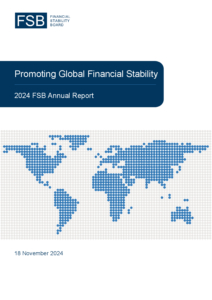Press enquiries:
+41 61 280 8477
[email protected]
Ref: 30/2024
- FSB Chair’s letter is accompanied by the FSB’s Annual Report, which highlights that progress in implementing key G20 regulatory reforms is uneven and that challenges remain. The FSB Chair urges the continued, full, consistent, and timely implementation of agreed-upon financial regulatory reforms.
- Chair’s letter also details policy efforts aimed at mitigating risks associated with non-bank financial intermediation, digitalisation, and climate change.
- In this context, the FSB has submitted reports on artificial intelligence and on achieving consistent and comparable climate-related financial disclosures.
The Financial Stability Board (FSB) today published a letter from its Chair, Klaas Knot, to G20 Leaders ahead of their Summit in Rio de Janeiro on 18-19 November. The letter is accompanied by the FSB’s Annual Report, which describes the FSB’s work to promote global financial stability.
The letter warns of ongoing vulnerabilities within the global financial system, illustrated by recent episodes of market turmoil and the failure of several banks and non-banks in recent years. The March 2023 banking turmoil underscored the ongoing risk of bank runs and the need for quicker responses to deposit outflows. Enhancing the resilience of the non-bank financial sector remains a priority, with the FSB set to release policy recommendations addressing financial stability risks stemming from leverage in the coming year.
The letter stresses the importance of effective implementation of the FSB’s policies, emphasising that authorities must not only put policies into national laws and regulations, but also build the capacity to operationalise them. This message is reiterated in the FSB’s 2024 Annual Report, which accompanies the Chair’s letter. The Annual Report, which tracks the FSB member jurisdictions’ implementation of regulatory reforms, notes uneven progress in key G20 regulatory reforms, including the final Basel III reforms and non-bank financial intermediation (NBFI) reforms.
The letter notes the potential of digitalisation to bring greater efficiencies, including in new payment infrastructures and arrangements, which have the promise of enhancing efficiency and user experience. The FSB is developing policies to ensure consistent regulation across the various forms of payments and payment providers, whether by banks or non-banks, particularly in crypto-asset and cross-border payment arrangements. The FSB has also examined the financial stability implications from the use of artificial intelligence (AI) in the financial system. While the letter notes that existing policy frameworks address many AI-related vulnerabilities, as outlined in its report, the FSB will work with national authorities and other international bodies to monitor AI use in the financial system and assess whether existing frameworks are sufficient.
Additionally, with global exposure to climate-related financial risks becoming more evident, there is an increasing need for high-quality, consistent, and comparable firm-level disclosures. To this end, the FSB is supporting global efforts for jurisdictions to adopt, apply, or otherwise be informed by the disclosure standards issued by the International Sustainability Standards Board (ISSB). The FSB’s progress report on achieving consistent and comparable climate-related disclosures notes that around three-fourths of the FSB member jurisdictions have already made significant progress towards the adoption or other use of the ISSB Standards, but also documents some of the remaining challenges that need to be overcome.
Notes to editors
Since 2015, the FSB has published annual reports on the implementation and effects of G20 financial regulatory reforms. These reports highlight progress made by FSB members in addressing the issues that led to the 2008 global financial crisis and in building a more resilient financial system. In 2021, the report was revamped to be more forward-looking, reflecting the FSB’s shift towards new topics and emerging risks. The current report provides a high-level assessment of current vulnerabilities in the global financial system, summarises the FSB’s ongoing financial stability work, and reviews progress on G20 reforms, including evaluations or other assessments of their effects.
In July 2024, the FSB issued a consultation report that set out recommendations that aim to strengthen consistency in the regulation and supervision of banks and non-banks in their provision of cross-border payment services in a way that is proportionate to the risks associated with such activities. This approach reduces the prospect of regulatory arbitrage by establishing a level playing field, to the extent possible given differences in business models and risk profiles, for both banks and non-bank payment service providers. The final recommendations will be issued in December 2024.
The FSB coordinates at the international level the work of national financial authorities and international standard-setting bodies and develops and promotes the implementation of effective regulatory, supervisory, and other financial sector policies in the interest of financial stability. It brings together national authorities responsible for financial stability in 24 countries and jurisdictions, international financial institutions, sector-specific international groupings of regulators and supervisors, and committees of central bank experts. The FSB also conducts outreach with approximately 70 other jurisdictions through its six Regional Consultative Groups.
The FSB is chaired by Klaas Knot, President of De Nederlandsche Bank. The FSB Secretariat is located in Basel, Switzerland and hosted by the Bank for International Settlements.

